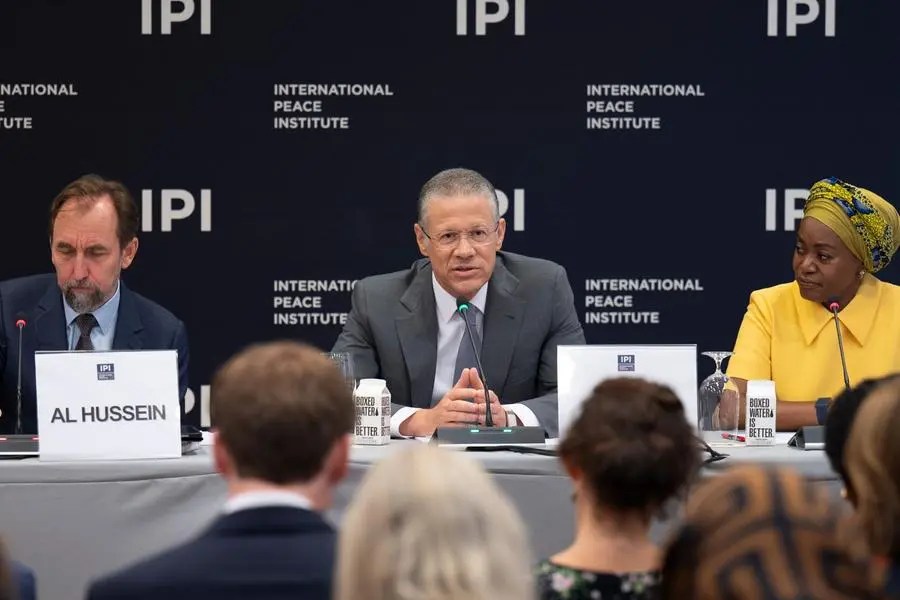
Global Leadership Series: Business of Philanthropy event at IPI./ PHOTO ; Courtesy:
Against the backdrop of growing global crises and shrinking humanitarian budgets, leading philanthropists, policymakers, and innovators gathered during the United Nations General Assembly and Climate Week in New York to underscore the role of philanthropy in advancing international aid and sustainable development.
The International Peace Institute (IPI), in collaboration with the UAE Special Envoy of the Minister of Foreign Affairs for Business and Philanthropy, hosted the high-level event Global Leadership Series: Insights from The Business of Philanthropy at IPI’s Trygve Lie Center, directly across from UN Headquarters.
The discussion was livestreamed worldwide, drawing a diverse audience of government leaders, business executives, and civil society organizations.
A Call for Strategic Collaboration
The event featured a conversation moderated by IPI President Zeid Ra’ad Al Hussein, with insights from H.E. Badr Jafar, UAE Special Envoy of the Minister of Foreign Affairs for Business and Philanthropy, alongside leading global philanthropists Tsitsi Masiyiwa, Executive Chair and Co-founder of Higherlife Foundation and Delta Philanthropies, and Jacqueline Novogratz, Founder and CEO of Acumen.
H.E. Badr Jafar drew upon lessons from his book The Business of Philanthropy: Perspectives and Insights from Global Thought Leaders on How to Change the World, which explores how philanthropy can catalyze systemic change.
He emphasized philanthropy’s unique capacity to operate at the intersection of government, civil society, and business.
“Philanthropy can and must play a much deeper role as the glue that binds political will and business innovation to generate the multiplier effect urgently needed across many of our shared existential challenges,” he said.
“Because it is more risk-tolerant, patient, and equitable than other forms of capital, philanthropy is set to become an increasingly essential force in the years ahead.”
Global Philanthropy at Unprecedented Scale
The discussion highlighted a striking reality: philanthropic capital is already at a scale that far exceeds traditional aid.
Global philanthropic flows now surpass $1 trillion annually, more than three times the world’s combined humanitarian and development aid, and more than ten times the climate finance committed by developed countries to developing economies in recent years.
In the United States alone, private philanthropy reached an estimated $600 billion in 2024, nearly ten times the peak funding levels of the United States Agency for International Development (USAID).
This demonstrates how private giving has become one of the largest sources of capital for addressing global challenges, and why unlocking its potential through strategic deployment is more urgent than ever.
Catalytic Funding and New Models of Impact
Panelists discussed the role of philanthropy in catalyzing blended finance approaches that de-risk follow-on investments from the private sector while creating space for public funding to scale.
By pairing philanthropic capital with business innovation, new models of financing can emerge that drive systemic solutions rather than temporary relief.
They also stressed the importance of innovation in giving practices.
New models include technology-enabled co-creation with indigenous and local communities, “many-to-one” giving platforms that democratize participation, and trust-based philanthropy that shifts power to those closest to the challenges.
These approaches, participants noted, are essential for strengthening legitimacy and impact in an era of complex, interconnected crises.
The UAE as a Global Hub for Philanthropy
The discussion spotlighted the UAE’s growing role as a convening hub for both business and philanthropy.
Through its partnerships and leadership initiatives, the UAE is positioning itself as a trusted global partner for cross-sector collaboration, bringing together governments, civil society organizations, and private capital to drive shared progress.
Tsitsi Masiyiwa emphasized the importance of inclusivity:
“We cannot afford to leave anyone behind. By working together across geographies and sectors, philanthropy can ensure solutions are sustainable, scalable, and grounded in the lived realities of those we aim to serve.”
Jacqueline Novogratz added: “Philanthropy’s true power lies in its ability to take risks on the ideas, the people, and the communities that others overlook. By investing patient capital in social entrepreneurs, we can unlock solutions that transform lives and redefine systems.”
Investing in the Future
The event concluded with a strong consensus on the need to invest in philanthropic infrastructure through academic research, data platforms, and convenings such as those hosted by IPI.
Equally vital is nurturing the next generation of leaders through mentorship, training, and access to networks that will empower young innovators to tackle global challenges with fresh approaches.
In an era where humanitarian and development resources are under severe strain, the conversation reinforced that philanthropy is no longer a peripheral actor but a central driver of global problem-solving.
Its capacity to be risk-tolerant, collaborative, and long-term makes it uniquely positioned to shape a more inclusive, resilient, and sustainable future.



